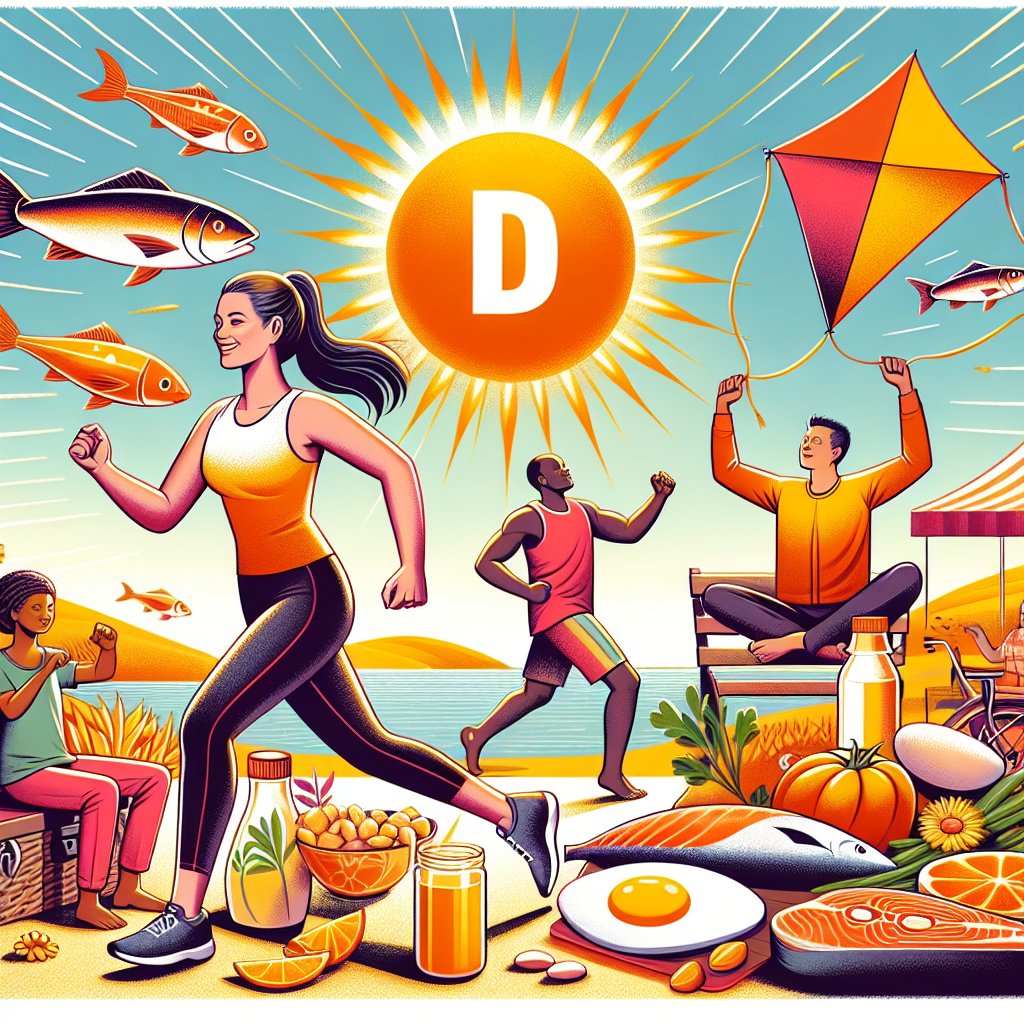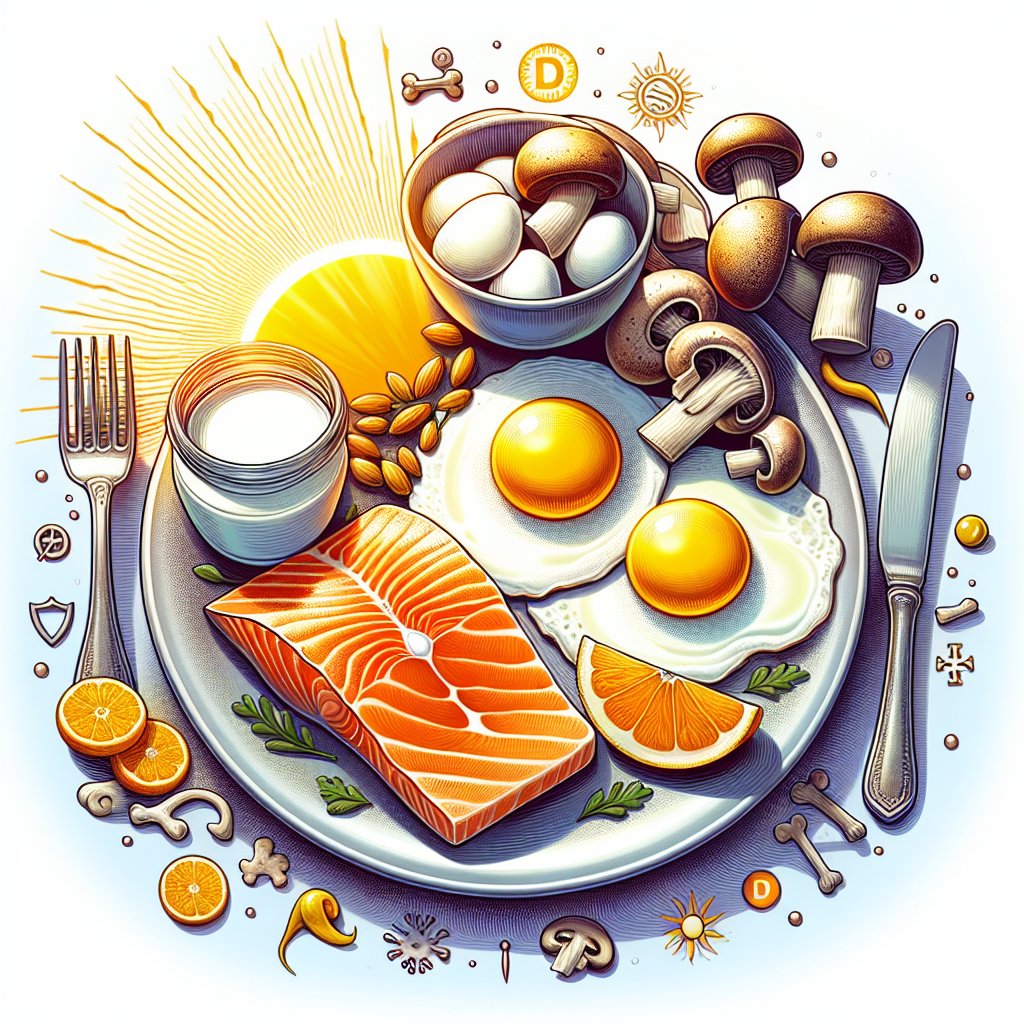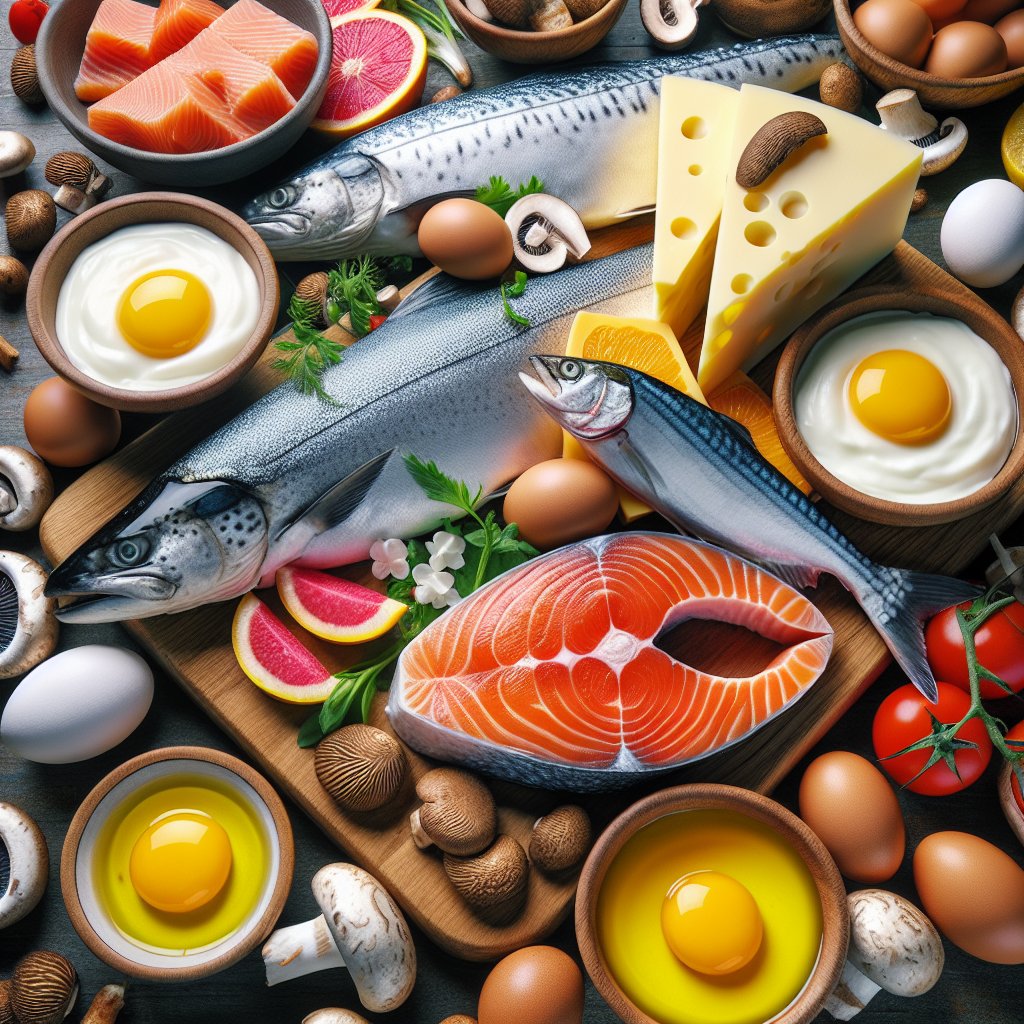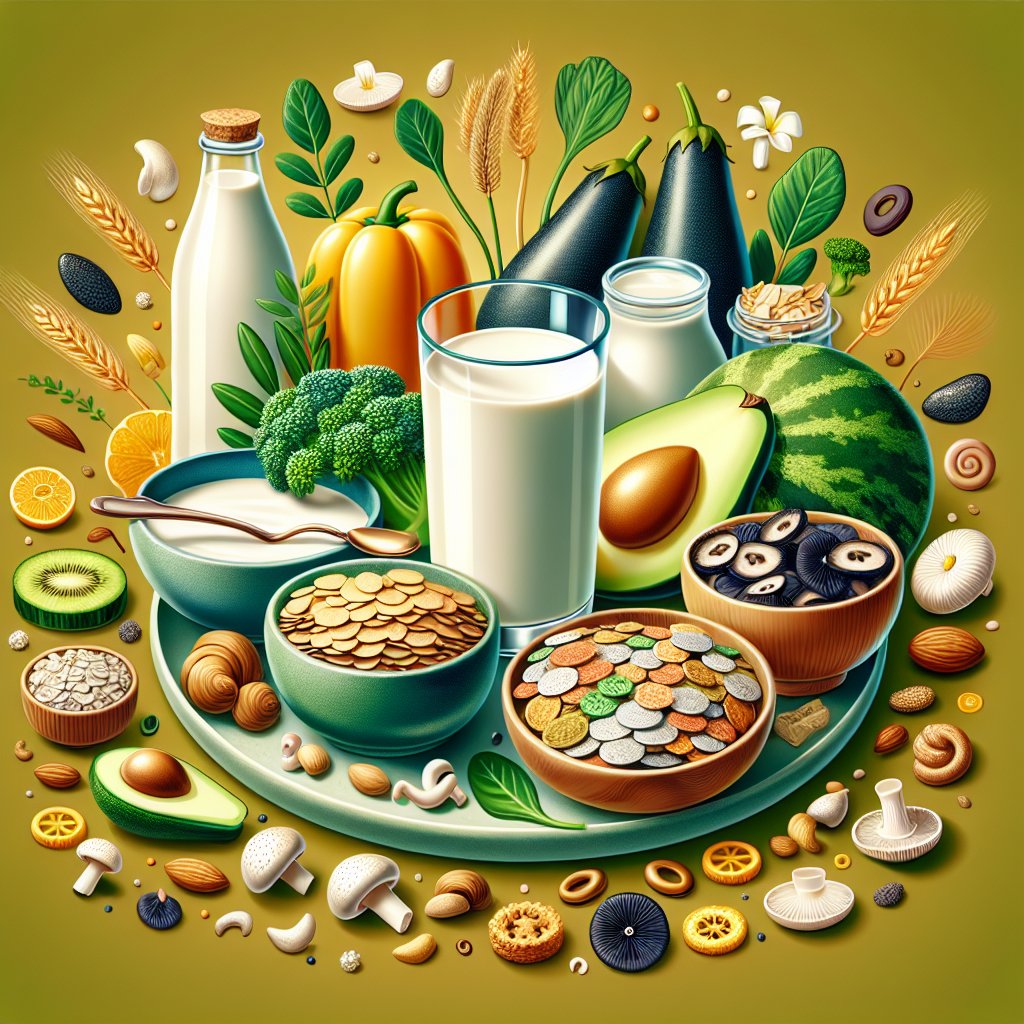Boost Your Health with These Vitamin D Foods: The Ultimate Guide to Maintaining Well-Being and Vitality!
Boost Your Health with These Vitamin D Foods:
The Ultimate Guide to Maintaining Well-Being and Vitality!
Welcome to our ultimate guide to maintaining well-being and vitality through the power of Vitamin D foods! In this article, we’ll dive into the importance of Vitamin D in overall health and well-being, explore the impact of Vitamin D deficiency, and provide a comprehensive list of delicious foods to help you boost your Vitamin D intake. So, let’s get started on this exciting journey to a healthier and more vibrant you!
The Importance of Vitamin D in Maintaining Overall Health and Well-being
Vitamin D is a crucial nutrient that plays a significant role in maintaining overall health and well-being. Known as the “sunshine vitamin,” Vitamin D is unique because it can be obtained through exposure to sunlight as well as from certain foods and supplements.
One of the primary functions of Vitamin D is its role in supporting bone health. It aids in the absorption of calcium and phosphorus, essential minerals for maintaining strong and healthy bones. However, the benefits of Vitamin D extend beyond bone health. It also plays a pivotal role in supporting the immune system, promoting heart health, and maintaining muscle function.
Research has shown that adequate levels of Vitamin D are associated with a lower risk of chronic diseases such as osteoporosis, heart disease, certain cancers, and autoimmune conditions. Additionally, Vitamin D has been linked to improved mood and mental well-being, showcasing its significance in overall health.
However, despite its importance, many people worldwide are deficient in Vitamin D, which can have detrimental effects on their health. Factors such as limited sun exposure, wearing sunscreen, living in regions with minimal sunlight, and having a diet low in Vitamin D-rich foods can contribute to deficiency. This is why it’s crucial to prioritize the inclusion of Vitamin D foods in your diet to ensure you are reaping the many benefits this vital nutrient has to offer.
In the following sections, we will explore the impact of Vitamin D deficiency and provide you with a comprehensive list of delicious foods that can help you maintain optimal Vitamin D levels and support your overall well-being.

Boost Your Health with These Vitamin D Foods: The Ultimate Guide to Maintaining Well-Being and Vitality!
Benefits of Vitamin D
Hey there, lovely readers! Today, we’re going to dive into the amazing world of Vitamin D and uncover its incredible benefits. So, grab your favorite keto-friendly snack, get comfy, and let’s explore the wonders of this essential nutrient.
Supporting Bone Health
You may have heard that Vitamin D is crucial for maintaining strong and healthy bones. But do you know why? Well, here’s the lowdown: Vitamin D helps your body absorb calcium, which is a key building block for bone strength. Without adequate Vitamin D, your bones can become brittle and more susceptible to fractures.
Studies have shown that individuals with lower levels of Vitamin D are at a higher risk of bone-related issues, such as osteoporosis. Interestingly, research also suggests that a diet rich in Vitamin D can improve bone density and reduce the risk of fractures, especially in older adults.
So, if you want to keep your bones strong and resilient, adding Vitamin D-rich foods to your diet is a fantastic step in the right direction!
Boosting the Immune System
Another amazing benefit of Vitamin D is its role in supporting a robust immune system. Your immune cells have receptors for Vitamin D, which means this nutrient plays a crucial part in helping your immune system function effectively.
Research has shown that Vitamin D can help reduce the risk of respiratory infections and contribute to a lower incidence of colds and flu. Furthermore, adequate Vitamin D levels have been linked to a decreased risk of autoimmune conditions, such as multiple sclerosis and rheumatoid arthritis.
By including Vitamin D foods in your meals, you can give your immune system the boost it needs to keep you feeling healthy and vibrant.
Reducing the Risk of Chronic Diseases
Now, here’s where Vitamin D truly shines – its potential to reduce the risk of chronic diseases. Studies have indicated that maintaining optimal levels of Vitamin D may lower the risk of various health conditions, including heart disease, diabetes, and certain types of cancer.
For instance, research has demonstrated that adequate Vitamin D levels are associated with a reduced risk of cardiovascular disease. Additionally, some studies suggest that Vitamin D may play a role in regulating insulin levels, which could be beneficial in lowering the risk of type 2 diabetes.
Furthermore, emerging research has pointed to a potential link between Vitamin D and a lower risk of certain types of cancer, such as colon, breast, and prostate cancer. While more studies are underway to solidify these findings, the initial results are certainly promising.
By incorporating Vitamin D-rich foods into your ketogenic diet, you can take proactive steps towards reducing the risk of chronic diseases and safeguarding your long-term well-being.
Wow, the benefits of Vitamin D are truly extraordinary! From supporting bone health to boosting the immune system and potentially reducing the risk of chronic diseases, this powerhouse nutrient plays a crucial role in maintaining overall health and vitality.
Ready to learn about the incredible foods that are brimming with Vitamin D? Well, keep reading, because we’re about to explore a tantalizing array of delicious options that will take your nutritional game to the next level!

Natural Food Sources of Vitamin D
When it comes to our health and vitality, getting enough vitamin D is crucial. This essential nutrient supports bone health, boosts the immune system, and helps regulate mood. Let’s explore a variety of natural, delicious foods that can help us meet our vitamin D needs.
Fatty Fish: Salmon and Mackerel
Fatty fish like salmon and mackerel are excellent sources of vitamin D. Just a 3.5-ounce serving of cooked salmon contains 386 IU (International Units) of vitamin D, which is around 50% of the recommended daily intake. Mackerel is also rich in this essential nutrient, with 360 IU per 3.5-ounce serving. These delectable fish not only provide a healthy dose of vitamin D but also offer a generous amount of heart-healthy omega-3 fatty acids.
Egg Yolks
For all you egg lovers out there, here’s some great news: egg yolks are a natural source of vitamin D. With approximately 44 IU of vitamin D per large egg, they offer a convenient way to enhance your vitamin D intake. Whether you like them scrambled, poached, or in an omelet, eggs can make a tasty addition to your diet, helping you meet your nutritional needs.
Fortified Dairy Products
Many dairy products are fortified with vitamin D, making them essential components of a balanced diet. A single cup of fortified milk can provide around 120 IU of vitamin D, helping you maintain strong bones and overall well-being. Additionally, yogurt and cheese are often fortified with vitamin D, offering versatile options to incorporate into your meals and snacks.
Mushrooms
For those following a plant-based or vegetarian diet, mushrooms can be a valuable source of vitamin D. When exposed to ultraviolet light, certain types of mushrooms can naturally produce vitamin D. Including varieties such as maitake or chanterelle in your meals can contribute to your daily vitamin D intake. Around 1 cup of diced, raw maitake mushrooms can contain approximately 786 IU of vitamin D.
Incorporating these vitamin D-rich foods into your diet can help ensure that you’re meeting your nutritional requirements for this vital nutrient, promoting overall health and vitality.

Plant-Based Sources of Vitamin D
Hey there, all you fabulous veggie lovers! If you’re following a vegetarian or vegan diet, you might be wondering about the best sources of Vitamin D to keep your health in check. While Vitamin D is commonly found in animal-based products, there are numerous plant-based options that can help you meet your daily requirements. Let’s dive into the world of fortified plant milks, cereals, and UV-exposed mushrooms, all of which can be excellent sources of this essential vitamin.
Fortified Plant Milks
Are you a fan of a creamy almond milk latte or a refreshing glass of soy milk? Well, here’s some great news: many plant-based milks are fortified with Vitamin D, making them a fantastic option for those following a vegetarian or vegan diet. According to a study published in the Journal of Food Science and Technology, research has shown that fortified plant milks can contain levels of Vitamin D comparable to cow’s milk. This means that you can still enjoy your favorite plant-based drinks while reaping the benefits of this vital nutrient.
When shopping for fortified plant milks, be sure to check the nutrition labels to ensure that they contain added Vitamin D. Look out for options like almond milk, soy milk, or oat milk that specifically state the inclusion of Vitamin D. Incorporating these fortified plant milks into your daily routine, whether in your coffee, smoothies, or cereal, can be an easy and delicious way to boost your Vitamin D intake.
Fortified Cereals
Crispy, crunchy, and oh-so-satisfying – fortified cereals are another excellent plant-based source of Vitamin D. It’s no secret that starting your day with a bowl of cereal can be a delightful morning ritual, and when those crunchy bites are packed with Vitamin D, it’s a win-win! A study published in the Journal of Agricultural and Food Chemistry suggests that certain fortified cereals can contribute significantly to the daily intake of Vitamin D for individuals following a vegetarian or vegan diet.
When selecting a fortified cereal, aim for whole grain and low-sugar options to maximize the health benefits. Check the packaging for the presence of added Vitamin D to ensure that you’re making a mindful choice for your morning meal. Pair your favorite fortified cereal with your preferred fortified plant milk for a double dose of Vitamin D that’ll leave you feeling energized and ready to conquer the day.
UV-Exposed Mushrooms
Now, let’s talk about the fascinating world of mushrooms – specifically, UV-exposed mushrooms. Did you know that when mushrooms are exposed to ultraviolet (UV) light, they have the remarkable ability to naturally produce Vitamin D? This process mirrors the way our skin synthesizes Vitamin D when exposed to sunlight. A study conducted by the Journal of Agricultural and Food Chemistry suggests that UV-exposed mushrooms can be a valuable source of Vitamin D for individuals following a vegetarian or vegan diet.
When shopping for mushrooms, look for varieties that have been specifically exposed to UV light, as they are more likely to have higher levels of Vitamin D. You may find these specially treated mushrooms labeled as “UV-exposed” or “high in Vitamin D” at your local grocery store or farmer’s market. Incorporating these mushrooms into your favorite meals, whether in stir-fries, salads, or pasta dishes, can not only bring a delightful umami flavor but also provide a natural boost of Vitamin D to support your well-being.
Conclusion
So, there you have it – a fantastic array of plant-based options to ensure that individuals following a vegetarian or vegan diet can still meet their Vitamin D needs. Whether it’s sipping on fortified plant milk, crunching on vitamin-packed cereals, or savoring UV-exposed mushrooms, there are plenty of delectable choices to keep your Vitamin D levels in check. With a mindful approach to your dietary selections, you can effortlessly incorporate these plant-based sources of Vitamin D into your daily routine and bask in the glow of a well-nourished, vibrant lifestyle. Cheers to your health and vitality!

Boost Your Health with These Vitamin D Foods: The Ultimate Guide to Maintaining Well-Being and Vitality!
Importance of Vitamin D Supplementation
Hey there, keto warriors! Today, let’s dive into the world of Vitamin D and explore when supplementation is essential, especially for individuals with limited sun exposure or specific medical conditions. Whether you’re soaking up rays or staying indoors, understanding the significance of Vitamin D supplementation is crucial for your overall well-being.
Why Vitamin D is Vital
Vitamin D is not just any regular vitamin; it’s more like a superhero that plays diverse roles in keeping our body healthy. From supporting our immune system and bone health to promoting cell growth and reducing inflammation, this sunshine vitamin is a force to be reckoned with.
The Sunshine Vitamin
Ideally, our skin synthesizes Vitamin D when exposed to sunlight. However, factors like geographical location, seasonal changes, and indoor lifestyles can limit sun exposure. This is where supplementation becomes crucial for maintaining optimal Vitamin D levels.
Limited Sun Exposure
If your daily routine keeps you indoors or if you live in a region with minimal sunlight, your body may not be producing enough Vitamin D. Research indicates that individuals with limited sun exposure may benefit from Vitamin D supplementation to bridge the gap and prevent deficiencies.
In a 2019 study published in the Journal of Clinical Medicine, researchers found that individuals with limited sun exposure who supplemented with Vitamin D showed significant improvements in their Vitamin D levels and overall health. This emphasizes the importance of supplementation in combating deficiencies caused by lifestyle or environmental factors.
Medical Conditions
Certain medical conditions can also impact our body’s ability to absorb or utilize Vitamin D effectively. For example, individuals with gastrointestinal disorders like Crohn’s disease or celiac disease may have malabsorption issues, leading to a higher risk of Vitamin D deficiency. In such cases, supplementation becomes necessary to ensure adequate Vitamin D intake and support overall health.
According to a study conducted by the World Journal of Gastroenterology in 2017, individuals with gastrointestinal disorders who supplemented with Vitamin D experienced a noticeable improvement in their symptoms and quality of life. This underscores the significance of targeted supplementation to address specific medical needs.
Age and Gender Considerations
As we age, our skin becomes less efficient at synthesizing Vitamin D from sunlight. Additionally, women undergoing menopause may have increased Vitamin D requirements. For these demographics, supplementation can play a pivotal role in maintaining healthy Vitamin D levels and supporting overall health and vitality.
A comprehensive review published in the American Journal of Clinical Nutrition highlighted the importance of Vitamin D supplementation for older adults and postmenopausal women in reducing the risk of falls and fractures. This sheds light on how targeted supplementation can address age and gender-related Vitamin D needs.
Overall, the scientific evidence unequivocally supports the necessity of Vitamin D supplementation, especially for individuals with limited sun exposure or specific medical conditions. By ensuring adequate Vitamin D intake, you’re taking proactive steps in nurturing your body and embracing a vibrant, keto-fueled lifestyle.
Stay tuned for the next section, where we’ll unveil an array of delicious Vitamin D foods to elevate your well-being and vitality!
Tips for Increasing Vitamin D Intake
Whether you’re following a ketogenic diet or simply aiming to boost your overall well-being, incorporating Vitamin D-rich foods into your daily meals is key to optimizing your health. Not only is Vitamin D essential for strong bones and a healthy immune system, but it also plays a role in mood regulation and overall vitality. Here are some practical tips to help you increase your Vitamin D intake and optimize absorption:
1. Choose Fatty Fish
Fatty fish such as salmon, trout, mackerel, and tuna are excellent sources of Vitamin D. Including these fish in your diet a few times a week can significantly boost your Vitamin D levels. For a keto-friendly meal, try baking or grilling a salmon fillet and pairing it with a side of leafy greens drizzled with olive oil.
2. Incorporate Egg Yolks
Egg yolks are not only a great source of protein but also contain a good amount of Vitamin D. Whether you enjoy them boiled, scrambled, or as part of a delicious omelette, adding egg yolks to your meals can be a simple way to increase your Vitamin D intake.
3. Fortified Foods
Many foods such as cow’s milk, plant-based milk alternatives, and some cereals are often fortified with Vitamin D. When shopping for groceries, look for products that specifically mention Vitamin D fortification on the packaging. Incorporating these fortified foods into your diet can contribute to your daily Vitamin D needs.
4. Enjoy Some Mushrooms
Mushrooms, especially those that have been exposed to UV light during growth, are a natural source of Vitamin D. Consider adding mushrooms to your salads, omelettes, or stir-fries to enhance the nutritional value of your meals while increasing your Vitamin D intake.
5. Optimize Vitamin D Absorption
In addition to incorporating Vitamin D-rich foods into your diet, it’s essential to optimize the absorption of this crucial nutrient. Here are some strategies to make the most of the Vitamin D you consume:
6. Spend Time Outdoors
Your skin produces Vitamin D when exposed to sunlight. Aim to spend some time outdoors, especially during the sunnier hours of the day. A leisurely walk or some light outdoor activities can contribute to your Vitamin D synthesis, boosting your overall levels.
7. Pair Vitamin D with Healthy Fats
Vitamin D is fat-soluble, meaning it’s best absorbed when consumed with fat. When planning your meals, include healthy fats such as olive oil, avocado, or nuts to enhance the absorption of Vitamin D-rich foods. For example, drizzling olive oil over a salad with Vitamin D-rich mushrooms can amplify the nutrient absorption.
8. Consider Vitamin D Supplements
If you find it challenging to meet your Vitamin D requirements through food sources alone, talk to your healthcare provider about the potential benefits of Vitamin D supplements. They can provide guidance on the right dosage and help ensure you’re getting adequate Vitamin D levels for your overall well-being.
By incorporating these practical tips into your daily routine, you can elevate your Vitamin D intake and optimize the absorption of this essential nutrient, ultimately contributing to your overall health and vitality.
The Importance of Vitamin D for Your Health
Before we dive into the ultimate guide of Vitamin D foods, let’s understand why maintaining adequate Vitamin D levels is crucial for your overall health. Vitamin D is a fat-soluble vitamin that plays a vital role in maintaining strong bones, supporting the immune system, and promoting overall well-being. Its impact on bone health is well-documented, as it helps the body absorb calcium, a mineral essential for bone strength. Furthermore, research has shown that Vitamin D may also play a role in reducing the risk of chronic diseases such as heart disease, diabetes, and certain types of cancer.
The Power of Vitamin D Foods
When it comes to ensuring you have adequate Vitamin D levels, the foods you eat can make a significant difference. Incorporating Vitamin D-rich foods into your diet can help you meet your daily requirements and support your overall health. Let’s explore some of the best Vitamin D foods to incorporate into your meal planning.
Fatty Fish: A Delicious Source of Vitamin D
Fatty fish, such as salmon, sardines, mackerel, and tuna, are among the best natural sources of Vitamin D. These fish are not only rich in Vitamin D but also provide essential omega-3 fatty acids, which are known for their numerous health benefits. Consuming fatty fish at least twice a week can contribute significantly to your Vitamin D intake and promote heart health.
Fortified Foods: A Convenient Option
Many foods, including milk, orange juice, and breakfast cereals, are often fortified with Vitamin D. This means that the vitamin is added to these products during manufacturing to help people increase their intake. Incorporating fortified foods into your diet can be a convenient way to ensure you’re getting enough Vitamin D, especially if you have dietary restrictions that limit your intake of other Vitamin D-rich foods.
Egg Yolks: A Nutrient-Packed Addition to Your Diet
Egg yolks are another good source of Vitamin D. Including eggs in your diet can provide you with essential nutrients, including proteins, healthy fats, and, of course, Vitamin D. Whether you enjoy them scrambled, boiled, or as part of a delicious omelet, eggs can be a versatile and nutritious addition to your meals.
Mushrooms: A Plant-Based Option for Vitamin D
For those following a vegetarian or vegan diet, mushrooms can be an excellent source of Vitamin D. When exposed to sunlight or UV light during growth, mushrooms have the ability to produce Vitamin D, making them a unique plant-based option for increasing your Vitamin D intake. Including a variety of mushrooms, such as shiitake or maitake, in your meals can offer a flavorful way to boost your Vitamin D levels.
The Sunshine Vitamin and Its Role in Boosting Mood
Vitamin D is often referred to as “the sunshine vitamin” because our bodies can produce it when our skin is exposed to sunlight. Beyond its physical health benefits, Vitamin D also plays a vital role in supporting mental and emotional well-being. Research has suggested that maintaining adequate Vitamin D levels may help regulate mood and reduce the risk of depression. This is especially relevant during seasons or in regions where sunlight exposure is limited.
Vitamin D and Immune Function
Emerging research has highlighted the potential role of Vitamin D in supporting immune function. Adequate levels of Vitamin D are essential for a well-functioning immune system, helping the body defend against infections and illnesses. While more research is needed to fully understand the relationship between Vitamin D and immune function, ensuring you have sufficient Vitamin D levels is an important step in maintaining overall health.
Maximizing Your Vitamin D Intake for Optimal Health
Now that you have a good understanding of the importance of Vitamin D and the variety of foods that can help you maintain adequate levels, you may be wondering how to ensure you’re maximizing your intake. Here are a few practical tips to help you make the most of Vitamin D in your diet:
Be Mindful of Sun Exposure
While sunlight is a natural source of Vitamin D, it’s important to balance sun exposure to minimize the risk of skin damage. Spending a moderate amount of time outdoors, particularly during the morning or late afternoon, can help your body produce Vitamin D. Just remember to protect your skin with sunscreen after getting your brief dose of sunshine.
Pair Vitamin D Foods with Healthy Fats
Since Vitamin D is a fat-soluble vitamin, pairing Vitamin D-rich foods with healthy fats can aid its absorption in the body. For example, enjoying a delicious salmon fillet with a side of avocado or drizzling olive oil over your mushroom and egg omelet can enhance the absorption of Vitamin D and other fat-soluble vitamins.
Consider a Supplement, if Necessary
For individuals who have limited sun exposure or have specific dietary restrictions, a Vitamin D supplement may be a practical option. Consulting with a healthcare professional can help you determine if a supplement is right for you and what dosage would best suit your individual needs.
Conclusion: Embrace Vitamin D Foods for a Vibrant, Healthy Lifestyle
Incorporating Vitamin D foods into your regular meal plans can be a delicious and rewarding way to support your overall health and vitality. Whether you savor a serving of grilled salmon, whip up a veggie omelet with Vitamin D-rich mushrooms and eggs, or sip on a refreshing glass of fortified orange juice, every bite or sip can contribute to your well-being.
Remember, maintaining adequate Vitamin D levels is not only essential for strong bones and immune function but can also have positive effects on your mood and overall vitality. By embracing a variety of Vitamin D foods and making smart, sun-safe choices, you can take proactive steps towards a vibrant, healthy lifestyle.


